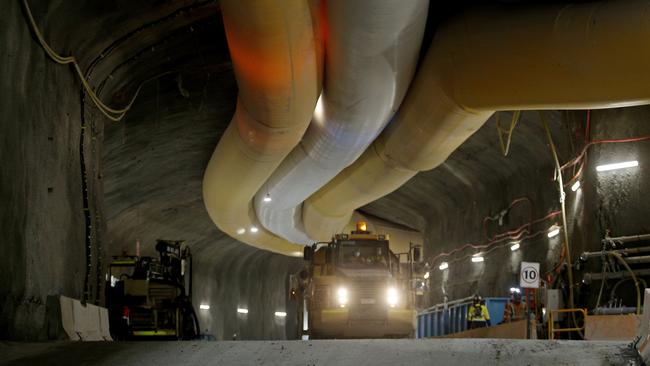Europe overtakes us as investors’ choice in global race for capital
For the first time in six years, Australia has fallen behind Europe as a place where international investors want to do business.

Investor confidence to fund big-ticket infrastructure in Australia has plunged, with Europe now seen as the superior destination for ever-fluid private capital.
A new report on international investment trends by industry think tank Infrastructure Partnerships Australia and Allens lawyers says the nation risks “being left behind” in the global race for cash, resources and skills.
For the first time since 2018, the annual Australian Infrastructure Monitor shows investors rate Europe more highly than here as a place to do business, reinforcing concern that government priorities and policies are driving them away.
The slump in confidence cut both ways, IPA chief executive Adrian Dwyer said. Australia had become less attractive to overseas investors as well as to domestic players such as the cashed-up superannuation funds when weighing where to invest.
He told The Australian: “Capital is a coward. It goes wherever it is treated best and if other places are treating it better, that’s where it will go.”
The Australian Infrastructure Monitor is an annual survey of international and Australian investors who collectively own or manage $716bn in infrastructure assets worldwide, now in its ninth iteration.
Pump-primed by US President Joe Biden’s green investment agenda, North America remains the region seen as having the most compelling infrastructure investment opportunities, according to 68 per cent of respondents.
Europe edged out Australia as the second-placed destination, 46 per cent to 43 per cent.
The report said it was notable “investors are increasingly drawn to the clarity of policy direction underpinning the energy transition” in North America and Europe, coupled with the regulatory incentives on offer there.
“With global competition for capital, skills and resources rising, Australia’s policy and investment signals are crucial in enhancing our competitiveness and investor appeal,” the report found.
“Labour costs, skilled labour availability and continued frustration with red and green tape are seen as the top challenges in investing in Australia. Investors are generally underwhelmed with initiatives such as the federal government’s Future Made in Australia, with far more concrete, investable plans in place in other regions.
“Investors are also watching a number of policy and market developments cautiously, including the industrial relations landscape, changes to taxation settings and government signals in response to the NSW independent review of toll roads.”
Mr Dwyer said the probe into toll pricing conducted for Chris Minns’s Labor government by former Australian Competition & Consumer Commission chair Allan Fels and transport expert David Cousins had “courted sovereign risk” when it “placed on the table a threat to rip up contracts” in interim findings this year.
One global investment adviser had told the survey: “It would be radioactive if the government reneged on a signed concession.”
While the NSW Premier subsequently pledged all existing toll contracts would be honoured, the episode sounded alarm bells across the infrastructure investment sector, Mr Dwyer said.
“That’s a shocking signal to send to the market,” he said.
Australia’s forward pipeline of major infrastructure now stands at 343 projects valued at $609bn. This includes 203 energy projects collectively priced at $417bn, and 74 transport projects at $126bn.
Although investors rated Australia’s economic stability and track record of infrastructure business highly, the monitor found the level of support had softened on those key criteria - down 10 per cent and 16 per cent respectively over the past year.
Investing in energy assets continued to be preferred, with 72 per cent of investors nominating interest in grid storage and firming, 69 in transmission and 62 per cent renewable power generation.
Despite this, challenges to delivering the energy pipeline remained.
Some 71 per cent of those surveyed believed adequacy of the transmission network was the biggest hurdle for the clean energy transition, while 64 per cent named policy and regulatory frameworks as the prime challenge. “There’s still plenty of interest in Australia but we need to get the settings right,” Mr Dwyer said.
“There’s concern that Australia isn’t as business-friendly as it once was.”



To join the conversation, please log in. Don't have an account? Register
Join the conversation, you are commenting as Logout